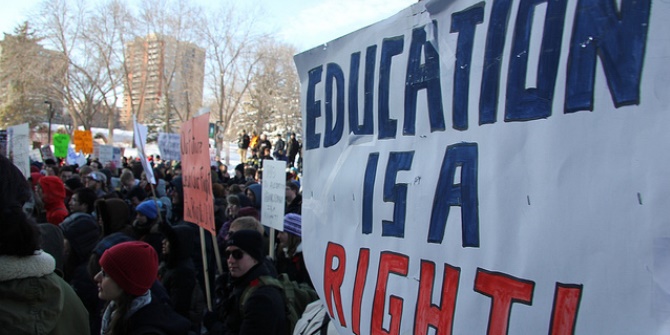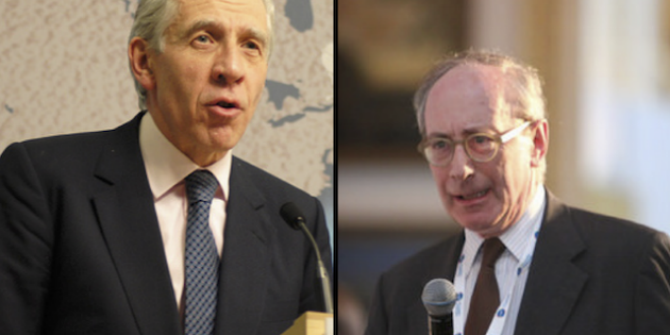 In a recent article for the BBC’s ‘a Point of View’ series, the conservative Philosopher Roger Scruton argues that democracy is overrated, and that we should value equal freedom and the protection of human rights ahead of it. Philip Pettit of Princeton University argues that Scruton is wrong to distinguish between the three, and that democracy is anything but overrated.
In a recent article for the BBC’s ‘a Point of View’ series, the conservative Philosopher Roger Scruton argues that democracy is overrated, and that we should value equal freedom and the protection of human rights ahead of it. Philip Pettit of Princeton University argues that Scruton is wrong to distinguish between the three, and that democracy is anything but overrated.
This article was originally published on the Democratic Audit blog.
In his piece, Roger Scruton distinguishes democracy, individual freedom and the protection of human rights, on the grounds that these are ‘three things, not one’. Using that as his premise, he suggests that democracy is overrated and questions a foreign policy of championing democracy elsewhere. Why should we champion democracy, he asks, when ‘democracy is often a threat to human rights and not a way of protecting them’? He suggests that it may be better to put aside democracy and campaign instead for institutions such as judicial independence, property rights, freedom of speech and legitimate opposition.
I agree with Scruton on the importance of these institutions. But I disagree strongly with the idea that the promotion of the institutions is separable from the promotion of democracy. First, there is no hope of promoting democracy without promoting such institutions. And, second, there is no prospect of securing such institutions without securing democracy. They are doubly associated.

Scruton equates democracy with popularly elected government. But on even the most minimal characterization of electoral democracy, such as that which Joseph Schumpeter popularized amongst political scientists in the 1940’s, it requires a system of election that is open, competitive and periodic, enfranchising all citizens that count by reasonable standards as qualified. No such system of election could operate properly without ensuring most of the institutions that Scruton rightly commends.
To be open the system would have to give individuals the freedom and right to state their views, stand for office and associate with one another in electoral campaigns. To be competitive it would have to make room for a right of legitimate opposition on the part of the defeated who hope to fight another day. To be periodic, it would have to enable the opposition and the people generally to assert a right against government’s continuing beyond a pre-set period in power. And to ensure rights in these three areas, the system would have to establish a mode of appointment or dismissal for the judiciary — the agency that gives substance to rights — that allows them independence from the government of the day.
What of property rights, a fourth institution that Scruton supports? Not to recognize property rights, the system would have to give elected government the discretion, depending on what is in its electoral interest, to reallocate property as it wishes: in a word, to neglect the rule of law in matters of ownership. But this would be a recipe for democratic disaster. No democratic electoral system could survive in the turmoil and chaos that such arbitrary government would introduce.
Scruton might possibly agree that to promote democracy, even democracy understood in a purely electoral sense, requires promoting those other institutions: that they are inseparable in that direction. Perhaps his only claim is that they are separable in the other direction: that in many circumstances we can and should promote those other institutions without sponsoring full-scale democracy. But I disagree also with this.
In order to enjoy property rights or the rights associated with judicial independence, freedom of speech and legitimate opposition, it is not enough to have the good fortune of enjoying the exercise of those rights. You must be able to exercise those rights, not as a matter of fortune or favor, but on an objectively and subjectively secure basis. You do not enjoy freedom of speech, for example, when the government lets you speak your piece as a token of goodwill: a concession or indulgence. You must have the license to speak as a matter of protected right that you can assert against government.
How could the rights required for these institutions be secure except in the presence of a democratic system that is truly open, competitive and periodic? Only such a system could ever give people the robust standing in relation to government that would establish such rights. Only such a system would enable individuals to stand on their own two feet, look the powerful in the eye and assert the claims they have to oppose the government, express what opinions they will, hold their property and look for their day in an independent court. There is no right without a secure right — no right without a power to assert it — and only the democratic control of government could secure the rights associated with judicial independence, freedom of speech, opposition to government and indeed ownership.
Scruton speaks of his friends in eastern Europe who looked in the 1980’s for the sorts of rights that he would prioritize over democracy. But those activists would not have been happy to be returned to the days of government goodwill associated, for example, with the Prague Spring of 1968. While the Dubcek government and its Soviet masters offered people an increased enjoyment of free speech and opposition in those days, they did not establish rights of free speech and opposition. It was always clear, even before the collapse of August 1968, that since the powers that be could always withdraw the privileges offered, particularly if they weren’t pleased with their exercise, those privileges never amounted to rights.
Just as there is no democracy without other institutions, then — no democracy without free speech, legitimate opposition, judicial independence and property rights — so it is impossible to have such institutions in any proper sense without democracy. The inseparability runs both ways.
The maintain this inseparability thesis is not to deny, of course, that when it comes to dealing with a non-democratic government, it may be good policy to put aside democratic recommendations as infeasible and concentrate on what is more profitably pursued. And it is not to deny that the most profitable overture in some cases will be to advocate that the government should grant people the rights — albeit, they can only amount to privileges — of judicial independence, legitimate opposition, freedom of speech and private property. But the pragmatic sense of such a policy should not lead us to think that democracy is as separable from proper rights in these areas as Scruton’s piece suggests that they may be.
At the beginning of this discussion, I said that Scruton associates democracy primarily with electoral government. I certainly think that the ideal of democracy requires an open, competitive, periodic system of election but in conclusion I would like to explain why I am unhappy about equating the two.
In my recent book, On the People’s Terms: A Republican Theory and Model of Democracy (CUP 2012), I argue for a view of democracy that is based on the republican premise that freedom is a paramount value and that freedom in any domain of choice requires security and protection against interference, not just the fortuity of avoiding it; freedom requires non-domination, not just non-interference. While law is needed to identify and protect the sphere in which each can enjoy such security, I hold that in order to avoid being itself dominating, government must be subject to a form of control that is equally shared amongst its people. And, in line with this argument, I equate democracy with the republican ideal in which the people or demos enjoy equally shared control or kratos over government.
While such equally shared control requires an open, competitive, periodic system of election, it requires much else besides. My first preference would have been to argue for the connection between an electoral system and the sorts of institutions cited by Scruton on the grounds that they all play important, interacting roles in the network of institutions needed to support democracy in that rich, republican sense. But I hope that the connection is palpable, even when we start with the austere equation between democracy and popular election.
Note: This article gives the views of the author, and not the position of the British Politics and Policy blog, nor of the London School of Economics. Please read our comments policy before posting.
Philip Pettit is Laurance S. Rockefeller University Professor of Politics and Human Values at Princeton University.








Mr Pettit might have misunderstood Mr Scruton’s stand; mr Scruton does not negate the merits of democracy, as evidenced by his observation that democracies “in general, go to war with each other, and do not, in general, experience civil war within their borders.” What Scruton might be trying to say is that the true nature of democracy requires certain foundations in order to thrive. And this opinion is no way different from Pettit’s insistence that “there is no hope of promoting democracy without promoting such institutions”.
And i think everyone can agree on this.
I concur with Dr. Pettit and disagree with the good Dr. Scruton. The latter seems to object hat there there are failures in society. As with many of the intelligentsia he seems to argue for Entitlements for all on his terms. Efficiency over all.
Democracy is ia a necessary condition for an Opportunity based society. It is based not on a Statist model, centralizing authority but on the ability of the most efficient level of governance, the functioning family, taking risks for interclass mobility. That basis requires that returns are available to the risk takers — just as failure might naturally occur. It is the process of obtaining economic rents which create through a multiplier a prosperous economy. Public investment is in this regard inefficient.
An additional necessary but not sufficient condition in this constrained optimization we call life is the presence of a moral education. Only the family has the right — and the duty – to create the common principles we call religion which enable a civilized society.
The statists insist on bread and circuses bypassing the family and creating through Entitlements dependencies and with that cooperation,
For all the individual brilliance in seeking a perfect Statist society, what inevitably occurs is the rise and primacy of what Milovan Djilas describes as “The New Class — the morass of Socialist bureaucracy from which the perfect state described by Marx will never emerge.